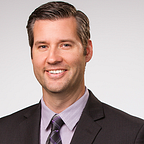Adaptiveness is more Important than Intelligence
Consulting Cliches
Of the many cliches about consultants (I’ve been in the industry a long time, so I’ve heard them all), one of my favorites is, “Consultants will borrow your watch to tell you what time it is.” Behind the not-so-subtle jab is the assertion that consultants are hired to come up with answers. Our industry’s prevailing sentiment is that we need to be the smartest people in the room to prove our worth, which creates a lot of unnecessary ego and leads to all sorts of happy hour punchlines.
Exponential Change
I’ve never liked the ego-centric, buzzword launching, boastfully intelligent consulting model (the word “synergy” has a special place in hell). More importantly, this model no longer works in today’s world of exponential change. The pace of change — both technological and social — has surpassed any one person’s ability to assimilate information, analyze it, and come up with the answers on their own. Unlike previous eras, the past is less of a predictor of future performance, meaning smart consultants are less able to analyze their way to the right solutions.
The best tool for finding answers is no longer intelligence but rather adaptiveness and co-creation.
Adaptiveness over Intelligence
When it comes to solving problems, the most important tool in generating ideas is an organization’s own people. So the best way a consultant can support an organization is to help them leverage and co-create what their individuals already know. This effort requires a much different skill than raw intelligence. It requires an adaptiveness to a group’s way of thinking in the context of the problem to be solved. Adaptiveness is the foundation that allows a consultant to coach a group through the generation, divergence, convergence, selection, and shared understanding of solutions from independent thinkers looking at a problem from different perspectives. As consultants, we no longer need to have the answer. We need to allow the answer to emerge from a network.
The Power of Networks
Networks are wonderfully creative and adaptive organisms. From a colony of ants to open source projects, networks can be defined as a group of entities with interdependent connections and informal organization. Nial Ferguson, author of “The Square and the Tower,” says that networks are creative and adaptable because of 1.) clusters of knowledge and 2.) the power of weak ties, which bring different perspectives with commonality to look at problems differently.
Weak ties are the key. According to Eric S. Raymond in “The Cathedral and the Bazaar,” the open source software movement was successful because a network of part-time developers didn’t have a complete graph (i.e., every developer talking to every other developer). Instead, they had very limited interaction with each other, reducing network complexity. The main interaction was between these developers and project moderators, who aggregated the power of weak ties to allow space for all perspectives, thereby producing great outcomes.
Networks and Consulting
The “power of different perspectives” is what drives a network’s value. In a network, the ideas of the many are better than the ideas of the few and allow the network to crowdsource interesting and often superior solutions to problems. Eric Raymond’s famous assertion about open source cooperation (called Linus’s Law) sums it up: “given enough eyeballs, all bugs are shallow.”
Our job as consultants is to coach the network through this process of co-creation. It is no longer to come up with the answers on our own. We don’t need to be the most intelligent, we need to help our clients adapt to rapid change and build a sustainable model of co-creation.
The next time you see a consultant acting like the smartest person in the room, politely tell them you know what time it is and walk away.
